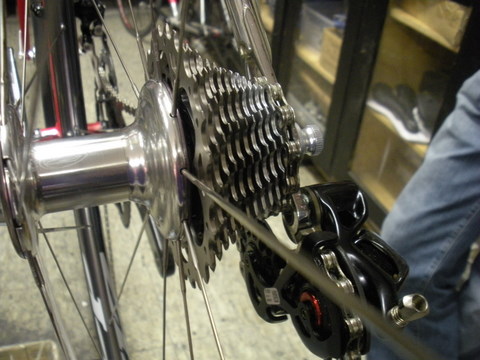Man, I am so glad my new road bike was built before January 1, 2011.
No, it’s not only because my beauty is one of the last Crown Jewels to be made in Somerville, Massachusetts, by guys who are no longer at IF, but because - phew! - my 18 lbs. steel road bike might actually be UCI legal...!
I really did have concerns that it might be judged “too aero,” but - lucky me! - the new UCI approval procedure only applies to frames and forks still in conception as of January 1, 2011. Oh, right, what am I talking about, you ask? Earlier this month, the UCI announced that it will be working with bicycle manufacturers to conform frames and forks to UCI standards. The stated goals are understandable, and it’s not hard to see how this might make everyone’s lives a little bit easier. Though concerns have been voiced as to how the new approval procedures might affect competitve cyclists, as a former anarchist sympathizer turned capitalist [once you realize that people are not innately good, anarchy ceases to become a viable political framework...or lack thereof], my first concern was, “poor Trek/Cannondale/Specialized/Cervelo.”

Actually, more like “poor engineers with any modicum of creativity at Trek/Cannondale/Specialized/Cervelo.” Because the imposition of rules and approval procedures onto individual manufacturers is really going to suck for the bike nerds out there. Sure, it wouldn’t make for embarrassing moments when one’s bicycle is deemed “illegal,” like it was a pound of cocaine, not a goddamn machine, but it could also stifle creativity and innovation. As any intellectual property attorney can tell you [or in my case, any attorney who has taken an intro intellectualy property class], protection of innovation is a balancing act between rewarding innovation [by allowing the initial innovator to recoup his investment in inventing], and encouraging further innovation [based on what has been newly invented]. Without financial incentive, one theory goes, creativity will decrease significantly, therefore making everyone else worse off than if you just hadn’t screwed with anythng in the first place.
With me so far? Okay, good. Under 35 U.S.C. § 101 et seq., which governs patent law in the US, a bicycle qualifies as a “machine,” which is patentable subject matter. This is not new. Just ask Cervelo. Patent law is the only method by which one bicycle manufacturer can protect its invention, because, hey, copyright and trademark aren’t really gonna help you, right [leave aside the whole “well trademarks are protected by trademark law blah blah blah” thing, okay?]? There are several requirements for an innovation to be patentable, including “nonobviousness,” defined as a significant change that is not simply a “small, incremental improvement [this is very fact specific and obviously varies case by case]. The fact remains: you can patent bicycle technology.

But regulations limiting how a manufacturer can build a bicycle - for example, how aero is too aero - will most likely also limit how inventive bicycle engineers can be. I’m not saying that the guys over at Specialized or Trek are going to throw up their hands and give up...just that with no incentive to be truly cutting-edge, we may risk losing that part about super aero bicycles with electrical shifting that give bike nerds like me giant boners. Because, let’s face it, without the possibility of pros riding said super bikes in the Tour or Spring Classics, there’s no point in making them. There’s no marketing advantage, no rise in brand name recognition because you made a super bike that is useless under UCI standards. In fact, with a list of "approved products" and manufacturers planned, it seems highly likely that the opposite will happen; that manufacturers will focus on getting as many of their products approved as possible. No doubt this will result in creative ways of producing bicycles that are more technologically advanced and meet the standards, but we may never see the physical product - those complicated angles and flattened tubes - that you know those engineers are dreaming about. And that kind of sucks.
On the bright side, with no pros able to ride super bikes, maybe they’ll become affordable and normal non-pro peeps can snatch them up! Just make sure you don't, you know, race it.